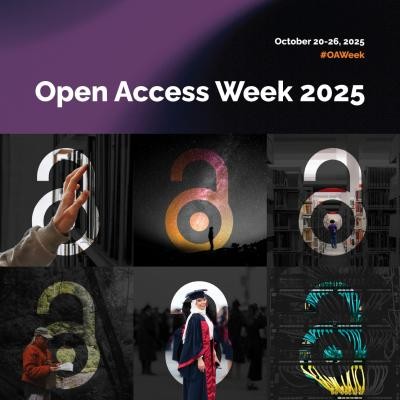
This year’s International Open Access Week is from October 20 to 26 and centers on a powerful theme: “Who owns our knowledge?” It’s a call to action for academic and research communities to reflect on how knowledge is created, shared, and controlled — and to reassert ownership over the intellectual outputs they produce.
At the University of Guelph, the McLaughlin Library is proud to support this movement through a range of open access initiatives that promote equity, transparency, and community empowerment.
Open Access Publishing and Journal Hosting
The library supports open access publishing through its Open Journal System, which enables faculty, students, and research groups to host and manage peer-reviewed journals. This infrastructure automates the publishing workflow, from submission to review to publication, while ensuring that content remains freely accessible to readers worldwide. “Our open access journals, supported by the U of G Library, amplify rural research across Ontario and beyond — shaping academia, informing public policy, and transforming local practice,” said Ryan Gibson, associate professor, School of Environmental Design and Rural Development, Ontario Agricultural College.
Whether launching a new journal or transitioning an existing one to open access, the library provides technical support, training, and guidance on editorial best practices, metadata standards, and long-term preservation.
Examples of journals hosted by the University of Guelph Library include:
- African Journal of Teacher Education – Focuses on teacher education across African contexts.
- Canadian Agri-food & Rural Advisory, Extension and Education Journal – Promotes innovation in agricultural and rural extension, communication, and development studies.
- Canta Aeide: Journal of Classical Studies – Covers topics in classical literature and history.
- CTRL+ALT+DH – An undergraduate journal from the Culture and Technology Studies program.
- Critical Studies in Improvisation / Études critiques en improvisation – Explores improvisation in community and social practice.
- Crossways Journal – Scholarly publication of the Crossways in Cultural Narratives Consortium.
- Flora: Undergraduate Philosophy Journal – Showcases philosophical writing by undergraduate students.
- Rural Review: Ontario Rural Planning, Development, and Policy – Dedicated to examining relevant rural planning, development, and policy topics related to building stronger rural, northern, and Indigenous communities in Ontario.
These journals reflect the library’s commitment to supporting both student-led and faculty-driven scholarship, while ensuring that research remains freely accessible to the public.
Supporting Tri-Agency Compliance
Through the Tri-Agency Open Access Policy, researchers funded by Canada’s major granting agencies (NSERC, SSHRC, and CIHR) are required to make their publications freely accessible within 12 months. The library assists U of G researchers in meeting these requirements by offering guidance on using open access repositories and on publishing in open access journals.
Open Educational Resources (OER)
Open education is a cornerstone of the library’s commitment to open access. OER — such as textbooks, videos, podcasts, and modules — are freely available and openly licensed, making them ideal for inclusive teaching. The library supports instructors with:
- Identifying and integrating OER into courses
- Navigating copyright and Creative Commons licensing
- Publishing with Pressbooks
- Ensuring accessibility and discoverability
Begin your search for OER.
Open Data and Research Transparency
The library also promotes open data practices through workshops and consultations on research data management. Researchers are guided in preparing datasets for deposit into the University of Guelph Research Data Repositories, ensuring compliance with FAIR principles — Findable, Accessible, Interoperable, and Reusable. Learn more about using open access repositories and how to find open data.
Our Ongoing Commitment
The McLaughlin Library continues to invest in open infrastructure, allocating part of its acquisitions budget to support open content and services. From journal hosting to repository access, these efforts reflect a deep commitment to democratizing knowledge and fostering a more equitable scholarly ecosystem. Read Our Commitment to Open Access.
Begin an Open Access Project
If you need support or want to get started with an open access project, book an appointment with us, or attend an upcoming workshop.
Questions?
Contact us. We’re happy to help.
License

This work is licensed under a Creative Commons Attribution-NonCommercial-ShareAlike 4.0 International License.